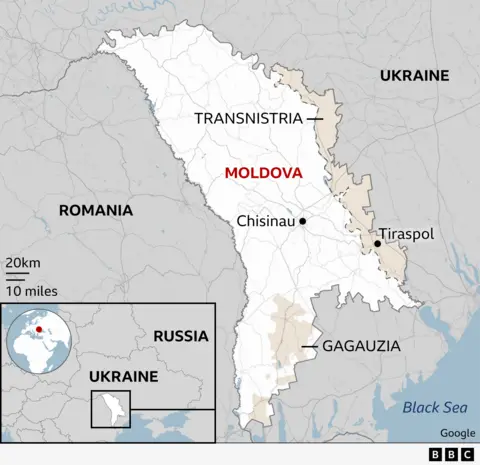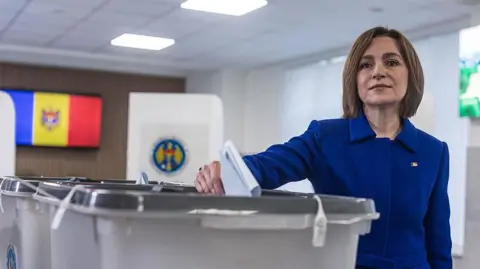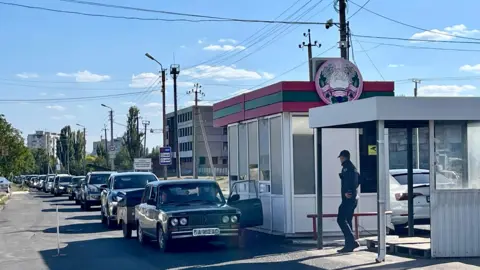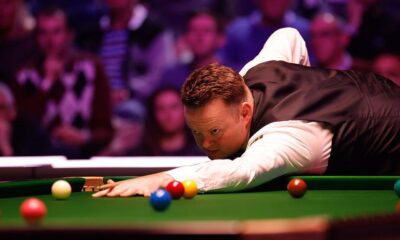Business
Pro-EU party in Moldova set to win election mired in claims of interference

Read full article on post.
Sarah Rainsford, Eastern and Southern Europe correspondentIn Chisinau and
Paul KirbyEurope digital editor in London
 Anadolu via Getty Images
Anadolu via Getty ImagesThe pro-European party of Moldovan President Maia Sandu is heading for victory in parliamentary elections seen as critical for her country’s future path to the EU.
Sandu, who had warned of “massive Russian interference” after voting on Sunday, said the future of her country, flanked by Ukraine and Romania, was at stake.
With 92% of the 1.6m votes counted, Sandu’s Party of Action and Solidarity (PAS) was on 48.4%, well ahead of the pro-Russian Patriotic Electoral Bloc on 25%. Turnout was over 52%, higher than in recent years.
One of the main opposition leaders, Igor Dodon, had claimed victory before results started coming in and called for protests outside parliament on Monday.
Results in recent Moldovan elections have fluctuated as counting has continued, because of late counts in urban areas and abroad, and partial results are not always reliable. However, the 275,000 voters who turned out on Sunday in the largely pro-Western diaspora are less likely to back the opposition.
Four years ago, the president’s party won a majority in the 101-seat parliament with 52.8% of the vote, and analysts said that based on latest results it was set to clinch a new majority with at least 53 seats.
If that were the case it would not need to rely on support from other parties set to win seats, such as the Alternativa bloc or the populist Our Party.
In a measure of the tension surrounding the vote, bomb scares were reported at polling stations in Italy, Romania, Spain and the US.
Similar scares were reported in Moldova itself and three people were arrested on suspicion of plotting unrest the day after the vote. The head of Sandu’s party, Igor Grosu, blamed criminal groups backed by Moscow for Sunday’s incidents and appealed for “patience and calm” to let the electoral process continue.
Moldova also has a pro-Russian breakaway enclave called Transnistria along its border with Ukraine, complete with a Russian military presence.
Residents in this sliver of land have Moldovan passports but have to cross the Dniester river to vote. Many are strongly pro-Moscow and Socialist party leader Igor Dodon said there had been “all sorts of harassment, stopping them from voting”.
Moldovans have been buffeted by Russia’s full-scale war in neighbouring Ukraine, but they are also grappling with spiralling prices and high levels of corruption.
President Sandu, 53, who won a second term of office last November, warned Moldovans the future of their democracy was in their hands: “Don’t play with your vote or you’ll lose everything!”
Dodon, who is one of Sandu’s main rivals, went on national TV as soon as polls closed to claim his pro-Russian allies in the Patriotic Electoral Bloc had won the election, despite there being no exit polls and before any early results were declared.
Thanking Moldovans for voting “in record numbers”, he called on the PAS government to leave power, and for supporters of all opposition parties to take to the streets on Monday to “defend” their vote outside parliament at midday.
“We will not allow destabilisation,” he promised. “The citizens have voted. Their vote must be respected even if you don’t like it,” he added, addressing President Sandu and her party.
One of the parties in Dodon’s bloc was barred from running two days before the vote because of alleged illicit funding.
In the run-up to the vote, police reported evidence of an unprecedented effort by Russia to spread disinformation and buy votes. Dozens of men were also arrested, accused of travelling to Serbia for firearms training and co-ordinating unrest. A BBC investigation uncovered a network promising to pay participants if they posted pro-Russian propaganda and fake news.
Parties sympathetic to Moscow rejected the police claims as fake and a show – created by the government to scare people into supporting them. Russia’s embassy in the UK rejected the BBC’s allegations, accusing Moldova and its “Western sponsors” of seeking to divert attention from Chisinau’s “internal woes”.
Inside all the polling stations visited by the BBC a small camera had been placed on a tripod overlooking the transparent ballot boxes.
Election monitors said they were recording everything, to be checked if there were any reports of violations.
Dan Spatar, who was at one polling station in the capital with his young daughter said he was choosing a European future over a Russian past: “We voted for this four years ago and deserve to continue with it. We see what happens every day in Ukraine and we worry about that.”
Moldova was awarded EU candidate status in 2022 along with Ukraine, four months after Russia’s full-scale invasion of Ukraine.
Marina said she was voting “for peace in Moldova, for a better life, for growing our economy” and felt it would be very hard for her country to continue its path to Europe with a pro-Russian government.
 Sarah Rainsford/BBC
Sarah Rainsford/BBCAt the edge of Moldova’s separatist enclave of Transnistria on Sunday, a long queue of cars waited to cross the river to register their vote at 12 polling stations opened beyond the administrative border, some of them more than 20km (12 miles) away.
The number of voters was down on recent years, at just over 12,000, an indication of the struggle many faced.
Moldovan police checked documents and car boots before letting them pass. Most cars had several people inside, often whole families.
By mid-afternoon, the queue stretched into the distance beyond a kiosk with a Soviet-style hammer-and-sickle emblem on top, and the green-and-red striped flag of Transnistria.
Speaking to drivers, most seemed unconcerned by the inconvenience, and the atmosphere was relatively relaxed.
One man told the BBC in Russian that he was voting for change because the PAS government had “promised paradise and delivered nothing”. No-one would be more specific than that, insisting their voting preference was “secret”.














